Top Ways to Prevent Vitamin Deficiency in Alpacas
To prevent vitamin deficiency in your alpacas, provide a balanced diet rich in protein, energy, and minerals, especially calcium and phosphorus. Supplement vitamin D during low-sunlight months, targeting pregnant or growing animals. Monitor pasture quality and adjust feed accordingly. Regular veterinary check-ups, including blood tests, help catch deficiencies early, so you can treat issues like rickets promptly. Taking these steps protects their health and well-being—there’s plenty more to explore for keeping your herd thriving.
Key Takeaways
- Provide balanced diets with adequate protein, energy, and a 2:1 calcium to phosphorus ratio tailored for alpacas’ unique digestive needs.
- Administer vitamin D supplements, especially in autumn, winter, and spring, starting injections at 2,000 IU per kg as recommended.
- Monitor pasture quality and adjust feeding plans seasonally, providing extra vitamin D and minerals during low forage availability.
- Conduct regular veterinary check-ups and blood tests to detect and address vitamin deficiencies early, especially in pregnant, lactating, and young alpacas.
- Use alpaca-specific feeds like NRM Alpaca Pellets and selenium-rich supplements to fulfill essential vitamin and mineral requirements.
Understanding Alpaca Nutritional Requirements
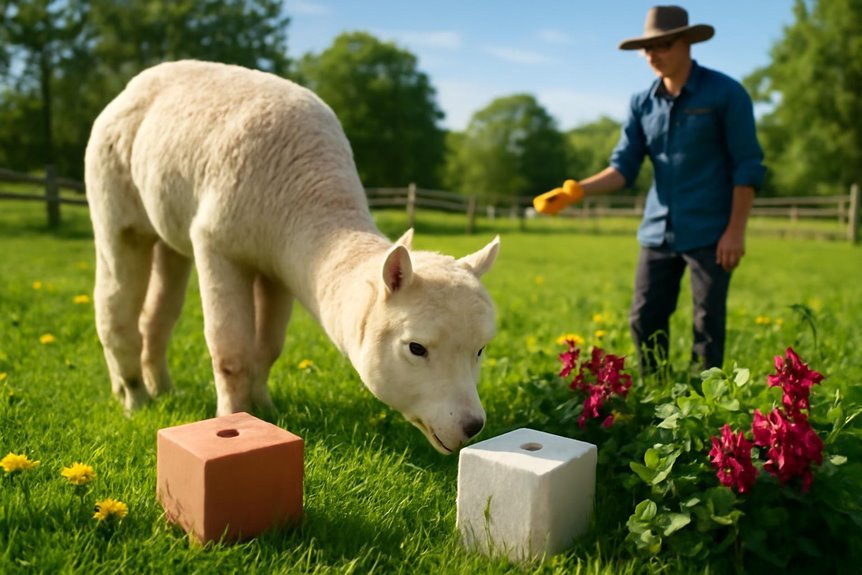
Although alpacas have a unique three-compartment digestive system, you’ll need to provide a balanced diet that meets their specific energy, protein, and fiber needs to keep them healthy. Pregnant and lactating alpacas, along with growing crias, require higher protein and energy to support growth rates and development. Maintaining the correct calcium to phosphorus ratio (2:1) is crucial to prevent mineral deficiencies that can impair bone health. Vitamin D plays a critical role in calcium absorption and immune system function, so vitamin D supplementation is especially important during winter months to avoid vitamin D deficiency. Without proper nutrition and supplementation, alpacas risk health problems like rickets, weakened immunity, and poor growth. Regularly monitoring diet and pasture quality guarantees your herd stays vibrant and healthy year-round.
Recognizing Signs of Vitamin Deficiency
When you spot symptoms like lameness, hunched backs, or neurological issues in your alpacas, it could indicate a vitamin deficiency. Vitamin D deficiency often causes symptoms of rickets, especially in young crias, leading to skeletal abnormalities and slowed growth rate. Darker-fleeced alpacas are particularly prone to this during winter due to limited sunlight. You should also watch for signs like lethargy or low appetite, which may signal other vitamin or mineral deficiencies. Pregnant and lactating alpacas need close monitoring, as they can pass deficiencies to their young. Keeping a close eye on your alpacas’ dietary intake and regularly evaluating their body condition helps you recognize these early warning signs and take timely action to protect their health and development.
Effective Vitamin Supplementation Strategies
Because vitamin deficiencies can seriously impact your alpacas’ health, establishing an effective supplementation plan is crucial. Focus on regular vitamin D supplementation, especially during autumn, winter, and spring, to prevent deficiencies in growing crias and pregnant females. Start vitamin D injections at 2,000 IU per kg in October, December, and February, particularly for darker-fleeced alpacas prone to rickets. Always consult a veterinarian to tailor your supplementation plan and avoid vitamin D toxicity. Before adding vitamin and mineral supplements, verify your alpacas’ energy and protein needs are met. Incorporate alpaca-specific feeds like NRM Alpaca Pellets, which contain higher levels of essential nutrients, including vitamins D and B1. This targeted approach will help you prevent deficiencies and support your alpacas’ overall health efficiently.
Managing Pasture and Feeding Practices
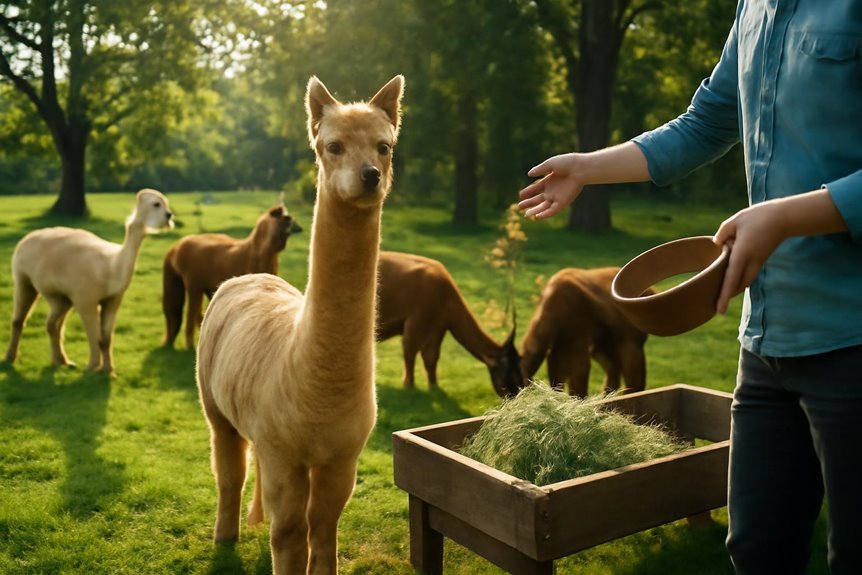
To keep your alpacas healthy, you need to carefully manage pasture and feeding practices by regularly calculating stocking rates to prevent overgrazing and guarantee consistent nutrient availability. Monitor pasture quality to adjust supplements, especially in winter and spring when forage is limited. Growing animals and pregnant females require additional vitamin D during these seasons to prevent deficiencies. Be sure to supplement a cria’s diet with balanced calcium and phosphorus to support bone development. Selenium-rich supplements are crucial, particularly in regions with selenium-poor soils, to maintain reproduction and immune health. Regularly evaluate your herd’s nutritional status with a blood sample to detect imbalances early. Tailoring feeding practices to your alpacas’ specific needs guarantees they receive all essential nutrients, helping you effectively prevent vitamin deficiencies throughout the year.
Veterinary Support and Monitoring
Although you can manage much of your alpacas’ nutrition through pasture and feeding, regular veterinary support is essential to catch and treat vitamin deficiencies early. Veterinary check-ups help monitor your herd’s nutritional status and detect issues like vitamin D deficiency, which can cause rickets. Blood tests performed by your vet provide crucial information on nutrient levels, guiding safe and effective supplementation. Always consult your veterinarian before starting supplements to avoid overdosing. Keeping detailed health records allows for better tracking of your alpacas’ condition.
- Schedule routine veterinary check-ups to monitor for deficiencies
- Use blood tests to assess vitamin and nutrient levels
- Seek prompt treatment for rickets and other deficiency-related conditions
- Maintain thorough health records to support tailored nutritional plans
Frequently Asked Questions
How to Prevent Vitamin Deficiencies?
You’ll prevent vitamin deficiencies by ensuring good vitamin absorption through dietary variety and nutrient balance. Prioritize sunlight exposure, feed quality, mineral intake, and conduct routine checks and regular health assessments to keep everything in check effectively.
What Vitamin Deficiency Do Alpacas Have?
You’ll find vitamin D deficiency common in alpacas, impacting nutrient absorption and mineral balance. Symptoms like lameness arise from seasonal changes and insufficient sunlight exposure, so meeting their dietary needs with proper nutrient sources is essential.
What Supplements Do Alpacas Need?
You’ll want to focus on vitamin supplements like vitamin D and B1, guarantee proper mineral intake, maintain nutritional balance through varied feeding practices, monitor health regularly, consider forage quality, and choose supplement types suited to your alpacas’ diet variations.
How to Prevent Vitamin a Deficiency in Cattle?
To prevent vitamin A deficiency in cattle, you should focus on feed quality, pasture management, and forage testing. Balance mineral intake, use diverse vitamin sources, monitor grazing habits, implement supplementation strategies, and regularly check cattle health for early signs.

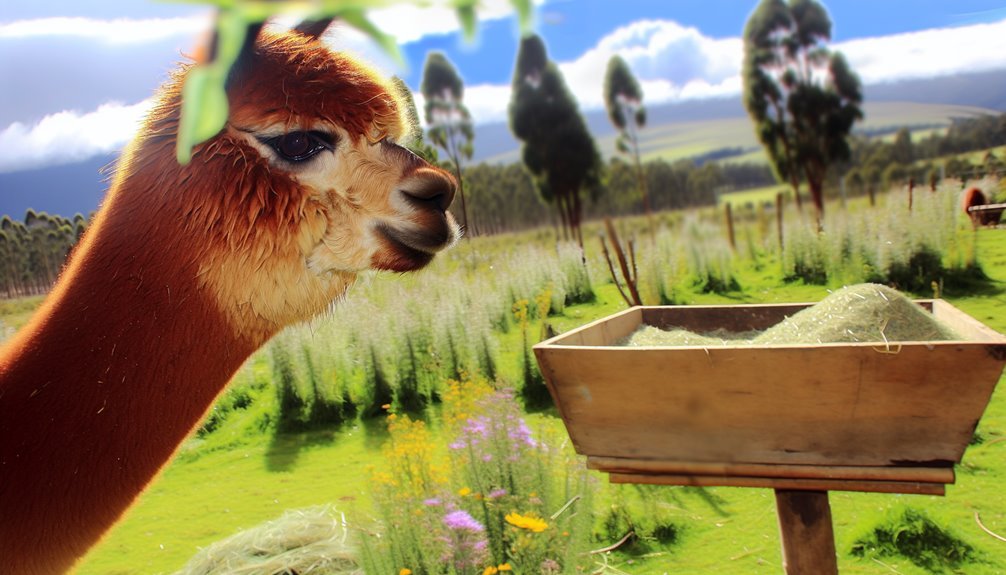
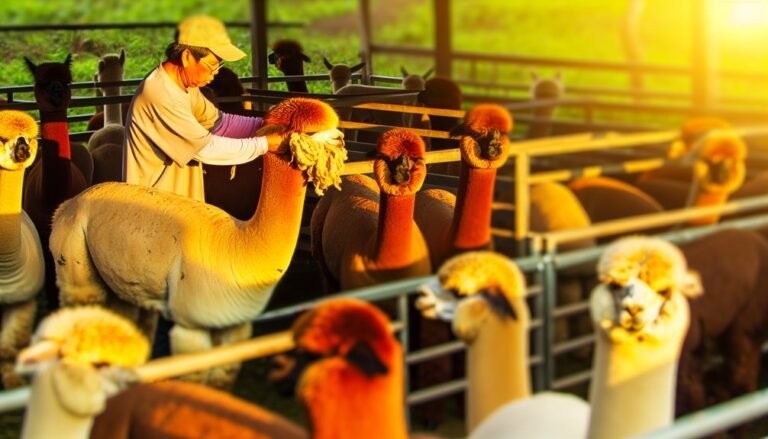
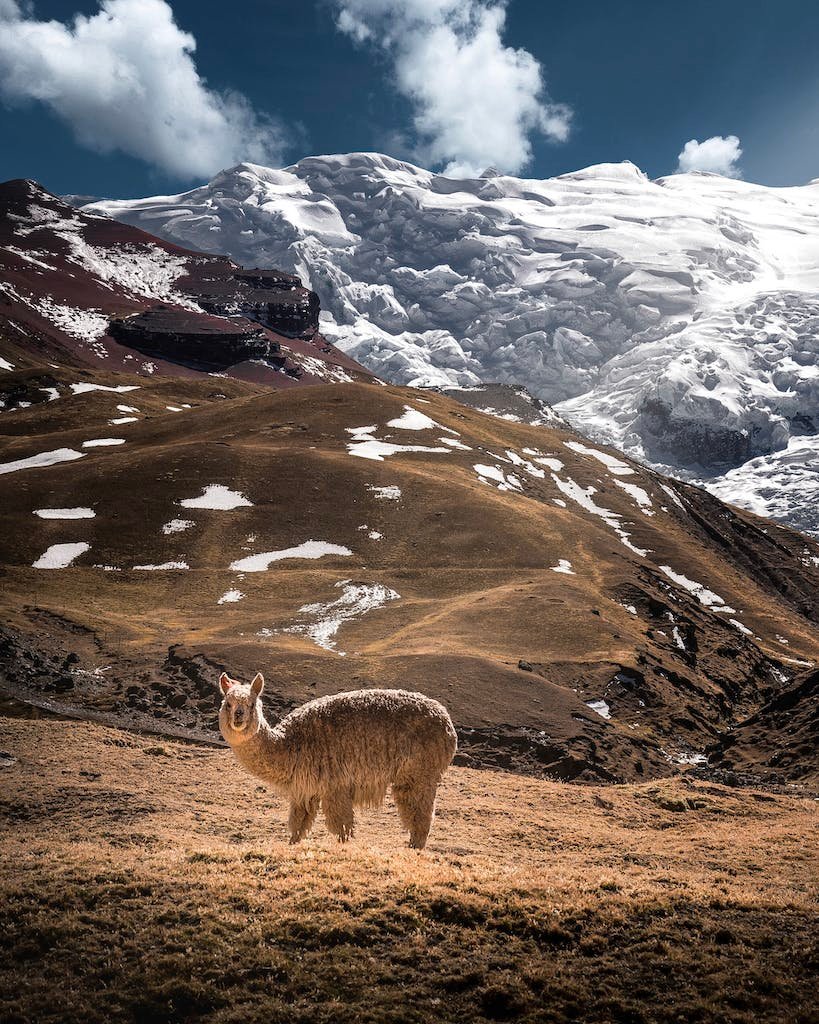
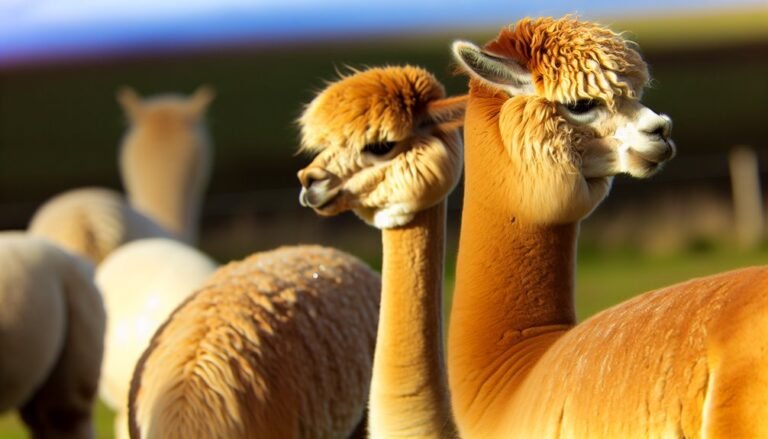



Our picks
Alpaca & Wool Felted Sole Inserts: Comfy Upgrade?
Best Alpaca Socks for Hiking: Ultimate Comfort and Durability on Trails
Best Alpaca Halter for Comfort and Control